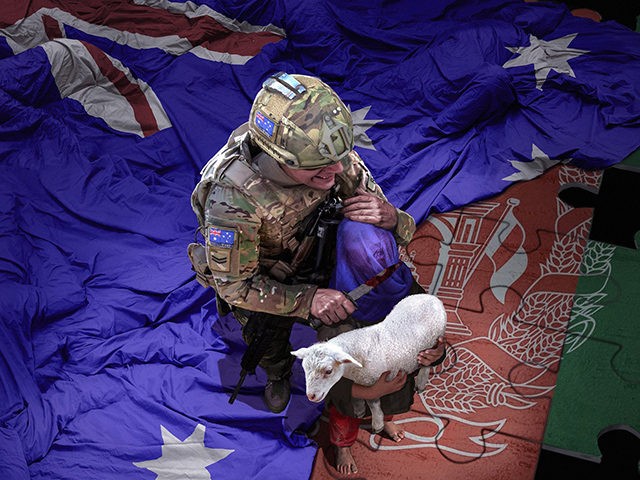Australian Prime Minister Scott Morrison on Monday demanded Beijing apologize after a top Chinese government spokesman posted a falsified image on Twitter on Sunday depicting an Australian soldier with his knife to a child’s throat, appearing to prepare to behead the child.
Morrison described the post by the official Twitter account of Chinese foreign ministry spokesman Zhao Lijian on November 29 as an “outrageous and disgusting slur” at a virtual news conference in Canberra on Monday.
“It is utterly outrageous and it cannot be justified on any basis whatsoever. The Chinese government should be totally ashamed of this post. It diminishes them in the world’s eyes,” Morrison told reporters.
“Australia is seeking an apology from the Ministry of Foreign Affairs, from the Chinese Government, for this outrageous post. We are also seeking its removal immediately and have also contacted Twitter to take it down immediately,” the prime minister added.
The tweet followed the November 19 release of an Australian government inquiry into alleged war crimes committed by members of the Australian special forces in Afghanistan from 2005-2016. The report recommended that 19 soldiers be investigated by the Australian Federal Police for the “unlawful killing” of 39 prisoners and civilians.
Responding to the report, Zhao tweeted on November 29:
Shocked by murder of Afghan civilians & prisoners by Australian soldiers. We strongly condemn such acts, &call for holding them accountable. pic.twitter.com/GYOaucoL5D
— Lijian Zhao 赵立坚 (@zlj517) November 30, 2020
“Shocked by murder of Afghan civilians & prisoners by Australian soldiers. We strongly condemn such acts, &call for holding them accountable [sic],” he wrote.
The text was accompanied by a falsified image of an Australian soldier holding a knife to a child’s throat. The illustration includes the line, “Don’t be afraid. We are coming to bring you peace!”
At press time, Twitter has not censored the post or labeled it to clarify that it is a doctored image.
Hú Xījìn, editor-in-chief of China’s state-run propaganda outlet Global Times, defended the illustration on November 29 via Twitter:
It is a popular cartoon that condemns the Australian Special Forces ’s brutal murder of 39 Afghan civilians. On what ground does Morrison feel angry over the use of this cartoon by the spokesperson of Chinese FM? It’s ridiculous and shameless that he demanded China to apologize. pic.twitter.com/QkBSXyf1uY
— Hu Xijin 胡锡进 (@HuXijin_GT) November 30, 2020
It is not clear what Hu meant by “popular,” as the image was not circulating widely on any free social media.
The Global Times further defended Zhao’s tweet on Monday with an article calling Australia’s demand for an apology “an attempt to divert public attention from Australia’s inhumane crimes in Afghanistan.”
While acknowledging that diplomatic and economic tensions between Australia and China have increased in recent months, Morrison said on Monday that “this is not how you deal with them.” The prime minister insisted that both parties must engage in direct dialogue between government ministers and leaders to de-escalate tensions.
“And despite this terribly offensive post today, I would ask again and call on China to re-engage in that dialogue,” Morrison said.
“This is how countries must deal with each other to ensure that we can deal with any issues in our relationship, consistent with our national interests and respect for each other’s sovereignty. Not engaging in this sort of deplorable behavior,” the Australian leader added.
Zhao serves a dual role as both spokesman of the Chinese foreign ministry and deputy director-general of the ministry’s information department. He has previously peddled other examples of Chinese Communist Party propaganda, including a conspiracy theory that the Chinese coronavirus pandemic was the result of a U.S. Army lab leak in Maryland in 2019. Zhao claimed without evidence in May that deaths related to the use of e-cigarettes in the U.S. in 2019 were early coronavirus cases linked to this alleged lab leak. E-cigarette disease, unlike coronavirus, is not contagious.

COMMENTS
Please let us know if you're having issues with commenting.